Blair Relieves Harney From Command
Tour Stop
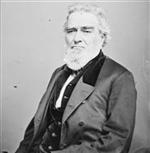
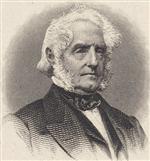
Following Camp Jackson, a number of conservative Missourians decided they needed to make a concerted effort to get the firebrand, Nathaniel Lyon, removed from Missouri. Sponsored by the Mayor of St. Louis, they decided to send James E. Yeatman to Washington to meet with US Attorney General Edward Bates. Ultimately they wanted to get Lincoln to have Lyon removed from the area. Yeatman would be joined by Missouri Lieutenant Governor Hamilton R. Gamble on the way to Washington. [89]
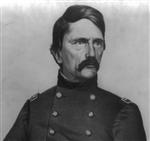
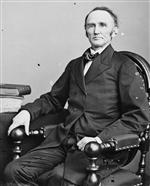
As soon as Harney had returned and assumed command, Frank Blair had gone back to work to get him removed. He sent his brother-in-law, Franklin A. Dick, to Washington to see his brother Montgomery Blair, the US Postmaster-General. When Dick arrived in Washington, Montgomery Blair immediately took him to see Secretary of War Cameron. [90]
On May 16th, Dick sent a couple of telegrams back to Bernard G. Farrar: [91]
I went at once to see Judge Blair, and told him of our affairs. He took his hat and went straight with me to see General Cameron. He was at the President's. We went there and found Mr. Lincoln, Mr. Bates, Mr. Smith (Secretary of the Interior), and General Cameron. I was introduced, and told my story straight on . . .
General Lyon stands in high position with the administration for his achievement. It is felt he has brought honor upon the Government by it; and the howling of the traitors is correctly appreciated here. The result is, the President and Cabinet fully indorse his conduct and appoint him a Brigadier-General, and effectually remove Harney out of his way. He must go ahead now and win new laurels. The capture of Claib Jackson will be regarded with great favor by the administration.
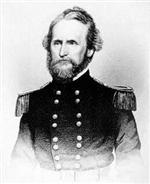
When Dick returned to St. Louis, he carried the message that Captain Nathaniel Lyon was a Brigadier-General of Volunteers:
War Department, May 17, 1861.
Brigadier-General Nathaniel Lyon, U. S. Volunteers, St. Louis, Mo.
Sir—You are hereby informed that the President of the United States has appointed you Brigadier-General of the volunteer force, raised in conformity with the President's proclamation of May 3, 1861, in the service of the United States, to rank as such from the 18th day of May, 1861.
Simon Cameron, Secretary of War.
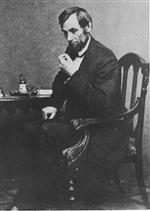
As it turned out, Lincoln did approve an order removing Harney from command, but had second thoughts in a private note to Frank Blair: [92]
My Dear Sir—We have a good deal of anxiety here about St. Louis. I understand an order has gone from the War Department to you, to be delivered or withheld in your discretion, relieving General Harney from his command. I was not quite satisfied with the order when it was made, though on the whole I thought it best to make it; but since then I have become more doubtful of its propriety. I do not write now to countermand it, but to say I wish you would withhold it, unless in your judgment the necessity to the contrary is very urgent. There are several reasons for this. We better have him a. friend than an enemy. It will dissatisfy a good many who otherwise would be quiet. More than all, we first relieve him, then restore him; and now if we relieve him again the public will ask, "Why all this vacillation?"
Still, if in your judgment it is indispensable, let it be so.
Yours very truly, A. Lincoln
Frank Blair decided to respect the wishes of the President of the United States by pocketing the order for Harney's dismissal. But Frank Blair continued to receive letters and telegrams from around the state describing the continued organization and mobilization of the State Guard forces. There were also rumors that troops from Arkansas were planing on entering Missouri. He brought these to the attention of Harney who sent an inquiry to Major-General Sterling Price. Price sent the following reply back to Harney: [93]
Jefferson City, May 24, 1861.
General W. S. Harney, U. S. Army:
I am satisfied your information is incorrect. It cannot be that arms or men are crossing into Missouri from any quarter without the knowledge of the Governor or myself, and we have no such information. I advise that you do not send a regiment into the Southwest—it would exasperate our own people.
I have attended to dispatches inclosed me by you, from Springfield and St. Joseph. I am dismissing my troops, and I will carry out my agreement faithfully.
Sterling Price, Major-General, Commanding Mo. S. G
Harney then answered back to Frank Blair: [94]
Dear Colonel—I send you a copy of a telegraph just received from General Price. It is what I expected and hoped; I consider it entirely satisfactory. Don't you?
Frank Blair was convinced that the Missouri State Guard leadership were using the cover of the Price-Harney Agreement to continue preparing for war. Blair was convinced that Price was not upholding his part of the agreement as the violence against pro-Union supporters continued. Of course, Blair kept his brother in Washington informed of all this, which prompted the War Department to send the following telegram to Harney: [95]
The President observes with concern that, notwithstanding the pledge of the State authorities to co-operate in preserving peace in Missouri, loyal citizens in great numbers continue to be driven from their homes. It is immaterial whether these outrages continue from inability or indisposition on the part of the State authorities to prevent them . . . The professions of loyalty to the Union by the State authorities of Missouri are not to be relied upon . . . The authority of the United States is paramount, and whenever it is apparent that a movement . . . is hostile, you will not hesitate to put it down.
Frank Blair finally decided that he had waited long enough. Blair sent Major Farrar to deliver Special Order No. 135 to Harney on May 30th: [96]
Washington, May 16, 1861, Special Order No. 135.
Brigadier-General W. S. Harney is relieved from command of the Department of the West, and is granted leave of absence until further orders.
Blair sent an explanation of his actions to President Lincoln: [97]
We have conclusive evidence that extensive preparations within this State are on foot to raise and arm large forces to make war upon the United States Government . . .
Day after day I have made known to General Harney what was occurring in the interior, and I have urged upon him the necessity of taking measures to protect the peaceful part of the people. His answer has been—“I will tell Price about it; I will get Price to correct it” and he has treated the statements of these men from the interior as untrue, or too insignificant to deserve attention . . .
The preparations of the enemy are now so active and formidable, that I am satisfied the President should order a large increase of United States forces in this State, so that troops may be enlisted and stationed at Jefferson City, Lexington, St. Joseph, Hannibal, Macon City, Springfield, and other points . . .
We are well able to take care of this State without assistance from elsewhere, if authorized to raise a sufficient force within the State; and after that work is done we can take care of the secessionists from the Arkansas line to the Gulf, along the west shore of the Mississippi.
Brigadier-General William S. Harney would issue General Orders No. 11, Department of the West from his head-quarters in St. Louis on May 30th: [98]
In pursuance of Special Orders, No. 135, of May 16, 1861, from the Adjutant-General's Office, the undersigned hereby relinquishes command of the Department of the West.
Now Brigadier-General Nathaniel Lyon was in command of the Department of the West. With Harney removed from the scene, Frank Blair and Nathaniel Lyon were free to carry out their campaign against the Secessionists.
